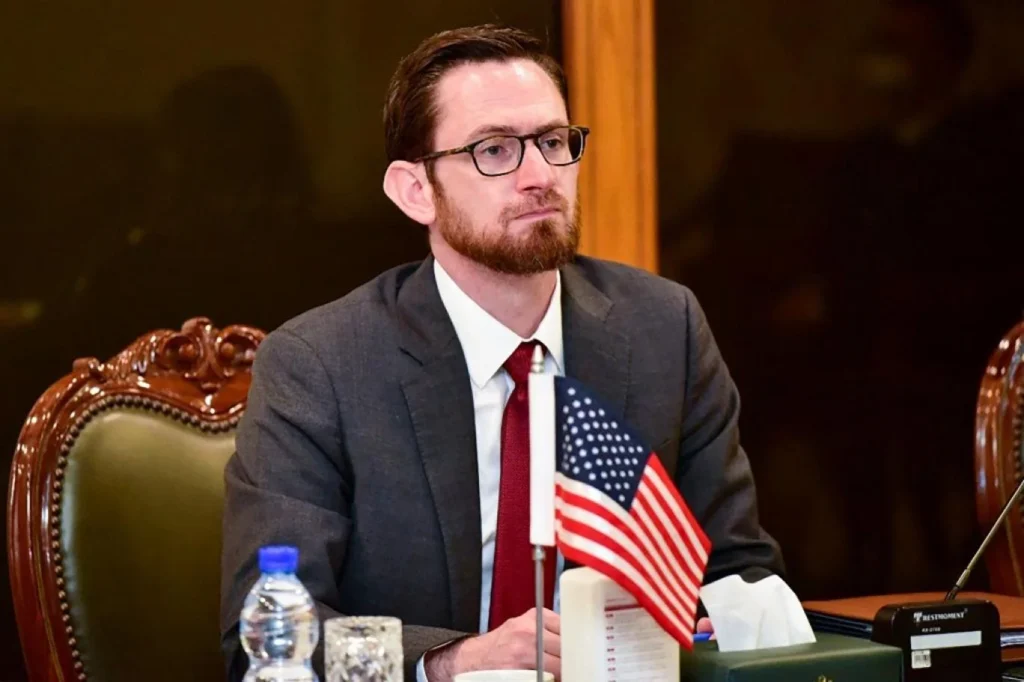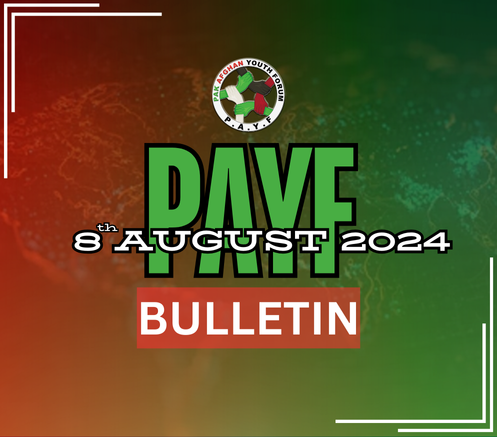Thomas West announced his resignation as Washington’s special envoy for Afghanistan. He stated that the U.S. remains committed to supporting Afghanistan and its people. West mentioned that the “resilience and courage” of Afghans have given him hope for the country’s future.
A few hours earlier, U.S. Secretary of State Antony Blinken announced West’s appointment as the acting head of the Office of Sanctions Coordination at the U.S. State Department.
Karen Decker, the Chargé d’Affaires of the U.S. Embassy for Afghanistan, Rina Amiri, the U.S. envoy for Afghanistan’s women, and another official will now take over West’s duties.
It remains unclear whether the U.S. government will appoint a new special envoy to replace West. It is also uncertain if they will eliminate the politically driven role.
West wrote that he “led U.S. diplomacy toward Afghanistan during a very challenging period.” He also reflected positively on his accomplishments over the past three years.
West has faced many critics, primarily due to his approach toward the Taliban. He distanced himself from anti-Taliban groups and maintained a softer tone in his dealings with the Taliban.
West stated that the “resilience and courage of countless Afghan journalists and human rights activists” have been a source of hope for him.
During his tenure, West made several trips to neighboring countries. However, he was unsuccessful in convincing those nations to use their influence to change the Taliban’s policies and behavior.
Assignment to Afghanistan
The departure of Thomas West leaves questions about the future of U.S. diplomacy towards Afghanistan. The ongoing challenges in engaging with the Taliban and securing meaningful change in the region highlight the difficulties in shaping Afghanistan’s political landscape post-West.
Officials still need to decide whether to appoint a new envoy, but they must continue to support Afghanistan’s civil society and human rights.
Thomas West, the U.S. special representative for Afghanistan, announced on Tuesday that he is stepping down from the role, ending a three-year tenure that overlapped the Taliban’s return to power in the country.
In October 2021, officials assigned Mr. West to the job, two months after the Taliban swept back to power as the Afghan army collapsed and then-president Ashraf Ghani left the country.
The chaotic U.S. withdrawal marked an early foreign policy low point for President Joe Biden’s administration, even though Donald Trump and his Afghan representative, Zalmay Khalilzad, brokered it.
Since returning to power, the Taliban have waged a guerrilla war against U.S. and Western forces for two decades. They have deprived women of basic freedoms, including access to the workplace and education. Women are now also forced to wear burkas outside the home.
“I will never forget the resilience and courage of the countless Afghan journalists, business leaders, human rights activists, students, refugees, former public servants, and humanitarian professionals I had the good fortune to ask for advice over the last three years,” Mr. West said.
“While I am moving on, America remains committed to Afghanistan and to supporting the Afghan people.” The international community has not recognized Afghanistan’s Taliban government, and the country remains in dire financial shape.
Thomas West Steps Down
State Department spokesman Matthew Miller acknowledged Mr. West’s departure and stated that three State Department officials would fill his role.
“We will continue to stay engaged on Afghanistan,” Mr. Miller told reporters. “It remains an enduring priority, and the work will now be led within the State Department by the chief of the U.S. mission to Afghanistan, Karen Decker, special envoy [Rina] Amiri, and ambassador John Pommersheim.”
“Today, I announce my departure from the role of U.S. Special Representative for Afghanistan to coordinate sanctions policy @StateDept. It was an honor to lead U.S. diplomacy on Afghanistan during an extremely difficult period for the country and the region. I will never forget the resilience and courage of the countless Afghan journalists, business leaders, human rights activists, students, refugees, former public servants, and humanitarian professionals I had the good fortune to ask for advice over the last 3 years. They left me with hope for a brighter future in which all Afghans are educated and empowered to support their families and grow their country’s economy. While I am moving on, America remains committed to Afghanistan and to supporting the Afghan people,” said Thomas West on X (Twitter).
Concerns Over Diplomatic Future
The U.S. becomes the second country after Pakistan that, as of today, does not have a dedicated Special Envoy for Afghanistan. This change follows the transition of Tom West from Special Representative on Afghanistan to Acting Head at the U.S. Sanctions Department at the U.S. State Department. Pakistan removed Asif Durrani from his position as special envoy for Afghanistan due to policy differences. However, the position itself remains. The special representative position was created in 2020 by the then-government of Prime Minister Imran Khan after the U.S.-Taliban Doha agreement. Afghanistan was taken over by Taliban forces in August 2021.
In May 2023, officials appointed senior diplomat Durrani. His role is to maintain contact with neighboring Afghanistan and other countries. He is also tasked with resolving the differences between Islamabad and Kabul over regional security issues.
His predecessor, Mohammad Sadiq Khan, resigned in March 2023.
Pakistan accused the Afghan Interim Government of hosting Tehrik-e Taliban Pakistan (TTP) militants inside Afghanistan, effectively giving them a base in Afghan territory to plan and carry out attacks against Pakistan.
The Afghan Interim Government has consistently denied the allegations.
As regional and geopolitical dynamics evolve, Thomas West’s resignation raises significant questions about the future of U.S. policy toward Afghanistan. The absence of a dedicated special envoy could hinder effective diplomacy. This is particularly concerning as regional dynamics continue to change and the international community remains wary of the de facto Afghan government. Furthermore, upcoming elections in the U.S. could shift priorities and focus away from Afghanistan. Therefore, the need for a robust and engaged diplomatic approach becomes even more pressing.



